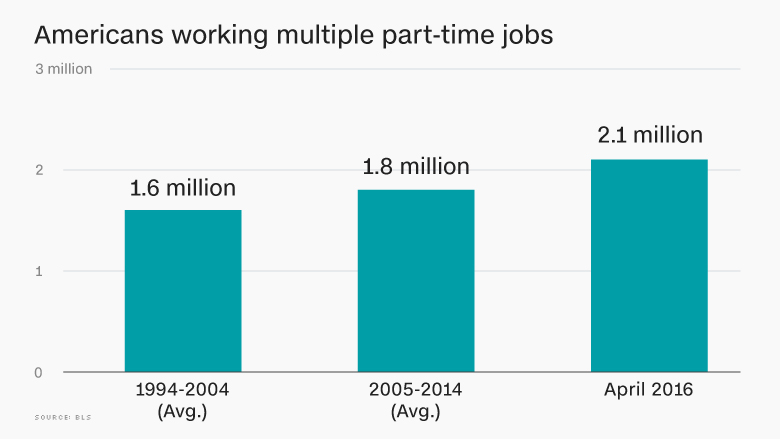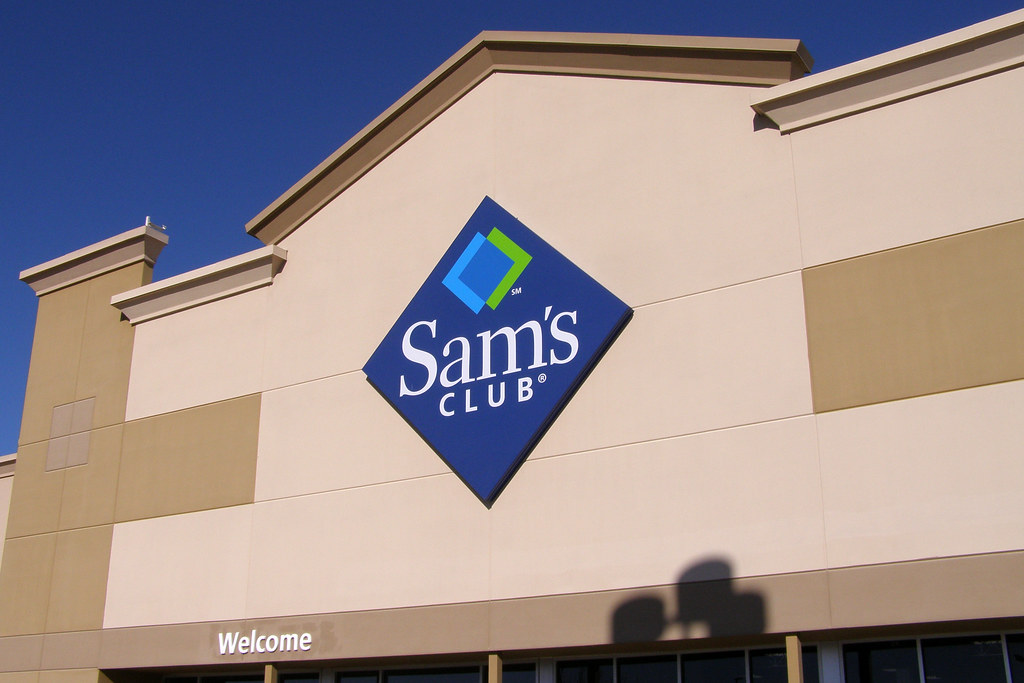Wednesday, July 13, 2016
Amazon Prime Day is biggest day for online retailer ever
(7/13/2016) Amazon is like a crazy vacuum machine. Amazon's self-created sales holiday is now the biggest online sales event ever. It may sucks out many people's summer purchasing budget and makes many other retailers dismal in their summer sales. Did you get sucked in?
Wednesday, June 29, 2016
Sam’s Club Forgot To Tell Some Employees About Their Clever Costco Promotion
(6/29/2016) If Sam's Club wants to take advantage of Costco's membership grunt, it should have done a better job called "business communication." Costco members went to Sam's Club with their Costco membership card, but they are not allowed to get in as promised, and some of them are charge with 10% non-member surcharge. Someone in Sam's Club in charge of this promotion should be blamed.
Saturday, June 4, 2016
Social Media and Digital Fear. Should We fear?
(6/4/2016)
I read this articleyesterday and thought through Mark Cuban's concern today many times. One
side is our psychological need to feel connected with other; the other side is
afraid of being known too much in a negative and unexpected way. Who should be
afraid?
I have to say what
Cuban said is a real concern, but it is also an evil of the chilling effect
from "the Power." First, social media has been a way of connecting
people in the 21st century. Before that, people are more isolated, for those
who are in minority (ethnic, sexual orientation, personal interest ...), it is
not easy to find someone who are alike. It is the same for someone who has
special interest. For example, I love science and astrophysics. For someone who
lives in a remote place, it will be very difficult to find someone who has
similar interest (through newspaper classified ad? local library? or
Craigslist???). Various social media connect people who are very far away but
share similar interest, similar background, similar culture, or similar
suppressed ideology. Of course, the bad guys can also take advantage of social
media. ISIS uses social media to recruit their fighters in Western
countries.
Social media as a tool
is neutral by itself, like knife, shot guns, or drugs. When people use it in a
beneficial way, they create social benefits; when people use it in a harmful
way, they causes damages and some people get hurts.
Cuban is warning that
in the future our social media and digital footprints will be used against us.
My question is who will use it against us? Who has that power and who are
"the Power?" The government (or the regime controller) and business
(that use various way to control the government). I am not against the
government, but in most countries (including democratic countries) the
government is always the entity defining the boundary of good and evil for the
society (through democratic way or not). It uses its influence in propaganda,
making legislations in the name of "maintaining social order" and use
the police system to do execution. Look at the "Drug War" initiated
by Nixon's government in the US. The US government used propaganda and
legislation to define what are legal drugs and what are not, it sent millions
of violators into prisons. Once the drug war started, the pharmaceutical
companies realized that is benefits to them because after the Drug war US
government outlaws several drugs that were cheap and easily accessible to
people (like Cannabis and cocaine) and have to buy drugs that are now made by
the pharmaceutical companies and 'approved' by the US FDA. In the US, the lobby
system makes it a perfect system of the elite control.
What Cuban warned is
that "the Power" will trace our digital footprints, which will be
used against us. I believe his vision is correct and his concern is valid
if we look back to our history. What I don't agree with Cuban is that "we
should self-sensor our personal expression, communication and interpersonal connection
under the threat." He thinks we should take actions to protect ourselves
and based on his recommendation we should either isolated ourselves from social
media, deleting our digital footprint once we leave one, or subscribe his
startup company's (Cyberdust.com) service, which claims providing private
messages in a encrypted private network. This is in their website:
PRIVATE
MESSAGING.
PRIVATE NETWORKING.
PRIVATE NETWORKING.
Send
private, encrypted, disappearing messages to friends or co-workers.
Build
intimate networks and private relationships with influential members and
celebrities. Secure, easy, and free.
It reminds me several
things. First, will it be totally private and safe? The recent war
between US FBI and Apple
iPhone decryption is still fresh in our memory. All
communications in that private network will be gone in a certain period of
time, and it looks wonderful. But it can also be disastrous. When the memories
of both parties goes vague, who memory is the correct one? The technology for
private messaging, private encrypted network is not difficult. If it truly
works in terms of financial success, I will say it is one of the easiest and
most profitable digital business model. Cyberdust.com don't need to build
thousands of server center like Google or Amazon, because most of the messages
will be deleted and they don't need many server at all. They don't even need to
worry much of lawsuit in losing client's data because they are deleted on
purpose.
Cyberdust also reminds
me of several companies that are profiting from selling "digital
fears" like "LifeLock." LifeLock provides "identity theft
protection service to help protect your finances and good name from identity
theft and fraud." A bunch of companies provide similar identity protection
against ID theft and fraud (free or paid service) and LifeLock claims they even
compensate your loss up to $1 millions, that many other companies don't
provide. This raises even bigger concerns: the complexity of service
coverage for digital ID protection is beyond average people's comprehension,
and the "service agreement" users "check" when they subscribe
always protect the service provider not the consumers. Did you see anyone who
read through the service agreement when they buy on an online website or
subscribe a digital service? "To Read All Of The
Privacy Policies You Encounter, You'd Need To Take A Month Off From Work Each
Year" Cyberdust will be the same. Cyberdust (or similar companies) are selling
"digital fears" to people and make $$$ out of that fear.
Of course, ID theft
and fraud is real and a big issue. Many consumers have experienced various
degrees of ID theft, password loss and personal information loss and privacy
breaches. But, now hackers don't go after individual Internet users, they go
directly to those companies server and steal chunk (millions or hundreds of
millions). There are plenty of examples: Target, Ashley Madison, US government,
Sony, Home Depot.... (See here for a list in recent years,
https://en.wikipedia.org/wiki/Data_breach#2016). Cyberdust is just sell a
different of fear, not ID theft or fraud, but personal damage from we
expressing on the Internet and social media.
I don't mean we should
not be concerned, I also don't mean that we should just reveal everything about
ourselves on social media without any discretion. But I want to see through the
forces that make us concern and fear of reasonably self expression and
interpersonal communication. A fear like that is when we cannot differentiate
what is a person's "right of expression" and then we allow the
government, business or other influential entities using people's digital
footprints to discriminate, or even criminalize individuals. When the society
allows that to happen (in some countries, it has happened already), we have
lost the spirit of open and democratic society. I hope that day will never
come.
Monday, May 23, 2016
Project Ara -- Futuristic Modular Android Phone
(5/23/2016) Do you feel it's pretty wasteful to upgrade electronic gadgets sometimes just for "better battery life," "better camera, higher pixels" while most of its functions are fine? Google's Project Ara will try to change it. It's a concept of modular design and allow consumers to 'upgrade' its mobile phone according their individual preferences. If you want a better camera, you buy an high-end camera module; if you want a better audio output, you buy a stereo speakers module (CNET's report). Project Ara is almost the opposite of iPhone's inflexible all-in-one, no-hassle concept.
I believe Project Ara can be a revolutionary game-changer in the mobile phone (maybe all electronic gadget) market. But I really hope Google's Android can have higher integrity in user platform and enhanced security. Without software's integrity, hardware module is just a fad. The video looks very cool, but do you remember the fad of Google Glass?
I believe Project Ara can be a revolutionary game-changer in the mobile phone (maybe all electronic gadget) market. But I really hope Google's Android can have higher integrity in user platform and enhanced security. Without software's integrity, hardware module is just a fad. The video looks very cool, but do you remember the fad of Google Glass?
Watch out, Apple! (However, I still think design integrity in Apple is executed much better than free-spirited Google)
The upfront cost for consumers to customized a modular Android phone can be more expensive (it's like the bill of a-la-carte sushi restaurant, always surprising). But in the long run, it may lead to a more eco-friendly, less wasteful market for electronic products and save $$$ for consumers. There will be less total revenue (and profit) for smartphone manufacturers like Samsung, LG, HTC, ... etc. in the long run if Project Ara is executed right, and they (Samsung, LG, HTC) may eventually be downgraded to "module provider" if lucky.
The upfront cost for consumers to customized a modular Android phone can be more expensive (it's like the bill of a-la-carte sushi restaurant, always surprising). But in the long run, it may lead to a more eco-friendly, less wasteful market for electronic products and save $$$ for consumers. There will be less total revenue (and profit) for smartphone manufacturers like Samsung, LG, HTC, ... etc. in the long run if Project Ara is executed right, and they (Samsung, LG, HTC) may eventually be downgraded to "module provider" if lucky.
 |
| Modular upgrade according to consumer's need |
Labels:
Android,
Apple,
google,
innovation,
Modular,
product design
Thursday, May 19, 2016
Conscious Innovation - Edible Six-Pack Rings
(5/19/2016) We have seen several pictures showing animal stuck in 6-pack rings. In the future, animals who are stuck with it may be able to rescue itself by chewing the ring. Saltwater Brewery makes the new 6-pack rings from their brewing byproducts (grains) and they are willing to share their innovation with big breweries.
 |
| Before animals got stuck for their whole life |
 |
| Now, they can enjoy a good meal when stuck. |
Wednesday, May 18, 2016
(Not Just A) U.S. problem: I work three part-time jobs
(5/19/2016) This is a common problem in the U.S. and in Taiwan (the country I came from). The low level of labor force is struggling to make their ends meet ( a news from CNN Money). "Part-time work has become a huge worry for experts who watch the U.S. economy. There are 6 million part-time workers who want full-time jobs. It's well above its pre-recession average of about 4 million workers."
Definitely part of the problem is the greed of capitalists, but part of the problem is that the labor cannot catch up the change of business environments and technology. The speed of changes of technology and business environments is speeding up, like the phenomenon of global warming.
The integration of computer, information technology, robots has replaced many jobs that are done by labors before. Decades ago, business needed many secretaries, typists, telephone operators, couriers (delivery documents in organizations, please watch the classic movie "Miracle on 34th Street"). Their jobs are way all gone. Now, even the jobs of white collar jobs, machine operators, skilled automobile workers, and delivery men (think about Amazon Drone), or maybe even professional photographer (watch this video) are at risk. The productivity growth from computer, IT and robots outpaces many labors of low ranks. People who have $$$ can invest on firms that provides solutions through computer, IT and robots and enjoy continuous good returns on investment (ROI); but labors who are ignorant of these changes are lagging further and further behind. This is a main cause of current income gap in many countries.
Before the government can take any effective actions, what we (labors) can do is at least to update our skills and knowledges with technology. However, technology skills and knowledges is not enough. The integration of computer, IT and robots can do a much better, accurate, and faster job and our human brains. We have to be able to be independent thinkers, capable to make good judgements based on our skills and knowledges. At least, in a near future (say, 20 years???), the robots are still not capable to make judgement and think like human beings.
Will automated selfie stick replace some professional photographer's jobs?
Definitely part of the problem is the greed of capitalists, but part of the problem is that the labor cannot catch up the change of business environments and technology. The speed of changes of technology and business environments is speeding up, like the phenomenon of global warming.
The integration of computer, information technology, robots has replaced many jobs that are done by labors before. Decades ago, business needed many secretaries, typists, telephone operators, couriers (delivery documents in organizations, please watch the classic movie "Miracle on 34th Street"). Their jobs are way all gone. Now, even the jobs of white collar jobs, machine operators, skilled automobile workers, and delivery men (think about Amazon Drone), or maybe even professional photographer (watch this video) are at risk. The productivity growth from computer, IT and robots outpaces many labors of low ranks. People who have $$$ can invest on firms that provides solutions through computer, IT and robots and enjoy continuous good returns on investment (ROI); but labors who are ignorant of these changes are lagging further and further behind. This is a main cause of current income gap in many countries.
Before the government can take any effective actions, what we (labors) can do is at least to update our skills and knowledges with technology. However, technology skills and knowledges is not enough. The integration of computer, IT and robots can do a much better, accurate, and faster job and our human brains. We have to be able to be independent thinkers, capable to make good judgements based on our skills and knowledges. At least, in a near future (say, 20 years???), the robots are still not capable to make judgement and think like human beings.
 |
| Source: http://money.cnn.com/2016/05/17/news/economy/job-multiple-part-time/ |
Will automated selfie stick replace some professional photographer's jobs?
Tuesday, May 17, 2016
100-Mile Local Food-Sourcing? Think Again
(5/18/2016) Are you willing to pay more in restaurant for local food sourcing, organic food, or non-GMO ingredient? If so, this article (Farm to Fable-- At Tampa Bay farm-to-table restaurants, you’re being fed fiction) will interest you and make you rethink again. It is an example of investigative journalism, which is very rare in modern days.
Many high-end restaurants claim their ingredients are from local farmers (and they normally charge a premium on that): the pork is from Farmer A, organic salad green is from Farmer B. There are several operational constraints that are too tough to pass.
First, many local farmers are small in scale and cannot afford to hire a professional account manager to handle all restaurants that 'claim' to be their clients. Most of these farmers have their produces handled by one or several distributors. They don't deal with so many restaurants directly.
Second, if a restaurant claims the ingredients are from more than several dozen's suppliers, the complexity of inbound logistic, paperwork, and account management is way too much for a stand-alone restaurant to handle.
Third, if the restaurant claims ingredients are shipped 'directly' from suppliers, the transportation cost is also very expensive. Food ingredients have to be fresh, so let's assume there are two delivery shipments every week. So how many pounds of pork could a restaurant buy every time? 200 pounds? This volume will be shipped at high cost because the volume is too small. So who is paying the premium in logistics?
Many high-end restaurants claim their ingredients are from local farmers (and they normally charge a premium on that): the pork is from Farmer A, organic salad green is from Farmer B. There are several operational constraints that are too tough to pass.
First, many local farmers are small in scale and cannot afford to hire a professional account manager to handle all restaurants that 'claim' to be their clients. Most of these farmers have their produces handled by one or several distributors. They don't deal with so many restaurants directly.
Second, if a restaurant claims the ingredients are from more than several dozen's suppliers, the complexity of inbound logistic, paperwork, and account management is way too much for a stand-alone restaurant to handle.
Third, if the restaurant claims ingredients are shipped 'directly' from suppliers, the transportation cost is also very expensive. Food ingredients have to be fresh, so let's assume there are two delivery shipments every week. So how many pounds of pork could a restaurant buy every time? 200 pounds? This volume will be shipped at high cost because the volume is too small. So who is paying the premium in logistics?
 |
| Source: http://www.tampabay.com/projects/2016/food/farm-to-fable/restaurants/ |
Subscribe to:
Posts (Atom)


